-
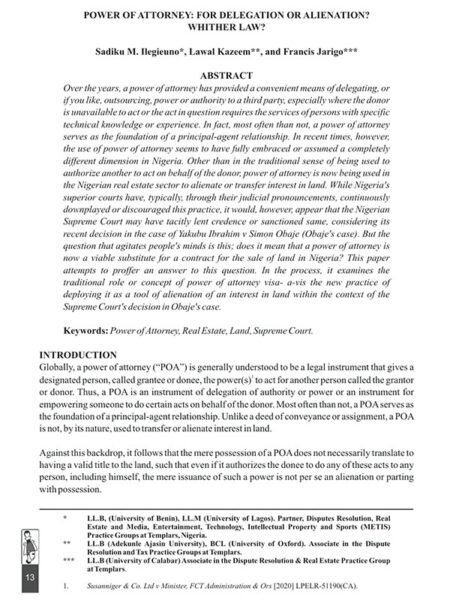
Power of Attorney: For Delegation or Alienation? Whither Law?
0₦2,500.00Sadiku Ilegieuno, Lawal Kazeem and Francis Jarigo, all of Templars, Nigeria, in their article, Power of Attorney: For Delegation or Alienation? Whither Law? note that other than using a power of attorney in the traditional sense to authorize a donee to act on behalf of a donor, power of attorney is now being used in the Nigerian real estate sector to alienate or transfer interest in land. While Nigeria’s superior courts have downplayed or discouraged this practice through their judicial pronouncements, Nigerian Supreme Court may have tacitly lent credence or sanctioned the practice, considering its recent decision in the case of Yakubu Ibrahim v Simon Obaje. Ilegieuno et al. consider whether a power of attorney is now a viable substitute for a contract for the sale of land in Nigeria. They examine the traditional role of the power of attorney vis- a-vis the new practice of deploying it as a tool of alienation of an interest in land within the context of the Supreme Court’s decision in Obaje’s case.
-
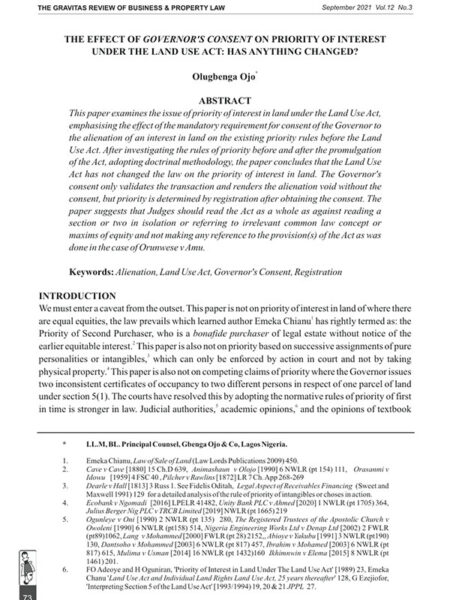
The Effect of Governor’s Consent on Priority of Interest Under the Land Use Act: Has Anything Changed?
0₦2,500.00Olugbenga Ojo, Principal Counsel at Gbenga Ojo & Co, in his article, The Effect of Governor’s Consent on Priority of Interest Under the Land Use Act: Has Anything Changed? examines the issue of priority of interest in land under the Land Use Act and the effect of the Governor’s Consent. He considers the rule of priority before the enactment of the Land Use Act, and under the Act to determine whether there are changes. He concludes that the Governor’s Consent only validates a transaction and renders an alienation void without the Consent, but priority is determined by registration after obtaining the Consent. He suggests that Judges should read the Land Use Act as a whole as against reading a section or two in isolation or referring to irrelevant common law concepts or maxims of equity as was done in the case of Orunwese v Amu.
-
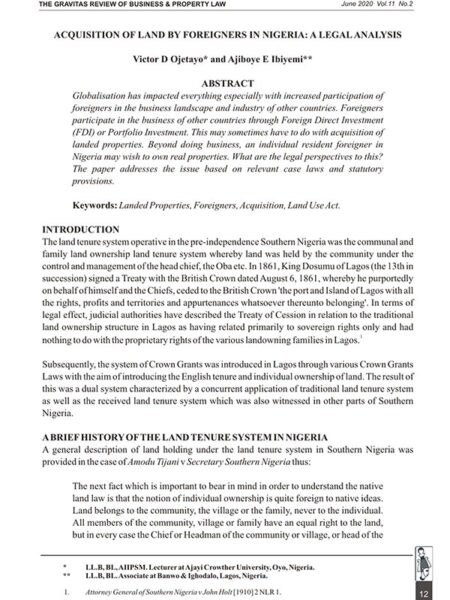
Acquisition of Land by Foreigners in Nigeria: A Legal Analysis
0₦2,500.00Victor Ojetayo of the Ajayi Crowther University Oyo Nigeria and Ajiboye Ibiyemi in their article, Acquisition of Land by Foreigners in Nigeria: A Legal Analysis, note that with the increased participation of foreigners in Nigeria’s economic landscape through Foreign Direct and Portfolio Investments, resident and non-resident foreigners may wish to own real property in Nigeria. Ojetayo and Ibiyemi present an exposition of relevant case laws, the Land Use Act, Acquisition of Land by Alien Law and other statutes for their perspective on acquisition of land by foreigners in Nigeria.
-
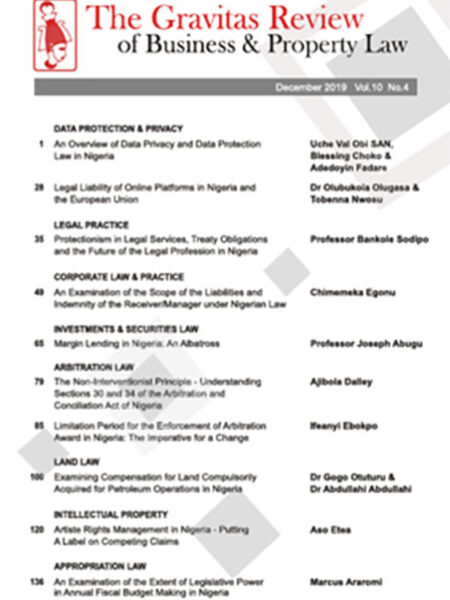
The Gravitas Review of Business & Property Law Vol.10 No.4 – Print
0₦5,000.00In this issue of The Gravitas Review of Business & Property Law Vol.10 No.4, there are well researched articles on:
- Data Protection & Privacy
- Legal Practice
- Corporate Law & Practice
- Investments & Securities Law
- Arbitration Law
- Land Law
- Intellectual Property
- Appropriation Law
-

The Gravitas Review of Business & Property Law Vol.10 No.4 – E-Book
0₦5,000.00In this issue of The Gravitas Review of Business & Property Law Vol.10 No.4, there are well researched articles on:
- Data Protection & Privacy
- Legal Practice
- Corporate Law & Practice
- Investments & Securities Law
- Arbitration Law
- Land Law
- Intellectual Property
- Appropriation Law
-

The Gravitas Review of Business & Property Law Vol.10 No.4
0₦5,000.00In this issue of The Gravitas Review of Business & Property Law Vol.10 No.4, there are well researched articles on:
- Data Protection & Privacy
- Legal Practice
- Corporate Law & Practice
- Investments & Securities Law
- Arbitration Law
- Land Law
- Intellectual Property
- Appropriation Law
-
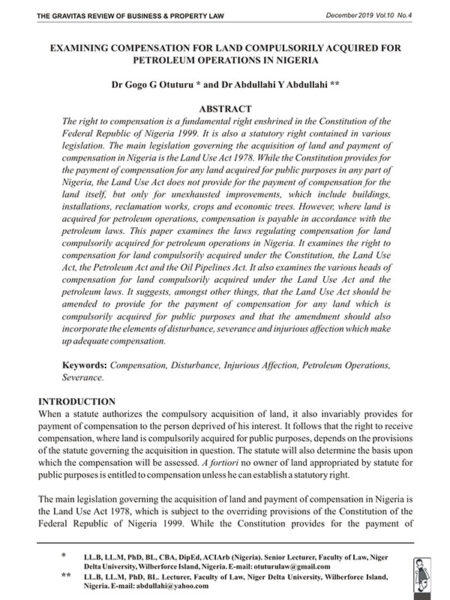
Examining Compensation for Land Compulsorily Acquired for Petroleum Operations in Nigeria
0₦2,500.00Dr Gogo Otuturu and Dr Abdullahi Abdullahi of the Faculty of Law, Niger Delta University, Wilberforce Island Nigeria in their article, note that the right to compensation for land compulsorily acquired is both a constitutional and statutory right. While the Constitution provides for the payment of compensation for any land acquired for public purposes, the Land Use Act provides for compensation, not for the land itself, but for unexhausted improvements. Where the land is acquired for petroleum operations, compensation is payable in accordance with the Petroleum Act and the Oil Pipelines Act. Otuturu and Abdullahi examine the various heads of compensation for land compulsorily acquired under the Land Use Act and the petroleum . They suggest an amendment of the laws to incorporate the elements of disturbance, severance and injurious affection.
-
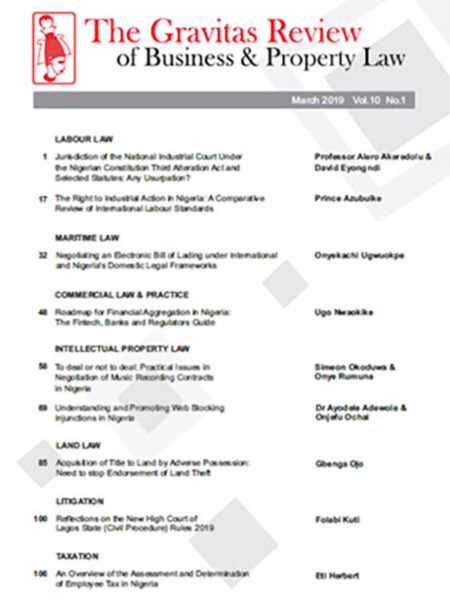
The Gravitas Review of Business & Property Law Vol.10 No.1 – Print
0₦5,000.00In this issue of The Gravitas Review of Business & Property Law Vol.10 No.1, there are well researched articles on:
- Labour Law
- Maritime Law
- Commercial Law & Practice
- Intellectual Property Law
- Land Law
- Litigation Practice & Procedure
- Taxation
-

The Gravitas Review of Business & Property Law Vol.10 No.1 – E-Book
0₦5,000.00In this issue of The Gravitas Review of Business & Property Law Vol.10 No.1, there are well researched articles on:
- Labour Law
- Maritime Law
- Commercial Law & Practice
- Intellectual Property Law
- Land Law
- Litigation Practice & Procedure
- Taxation
-

The Gravitas Review of Business & Property Law Vol.10 No.1
0₦5,000.00In this issue of The Gravitas Review of Business & Property Law Vol.10 No.1, there are well researched articles on:
- Labour Law
- Maritime Law
- Commercial Law & Practice
- Intellectual Property Law
- Land Law
- Litigation Practice & Procedure
- Taxation
-
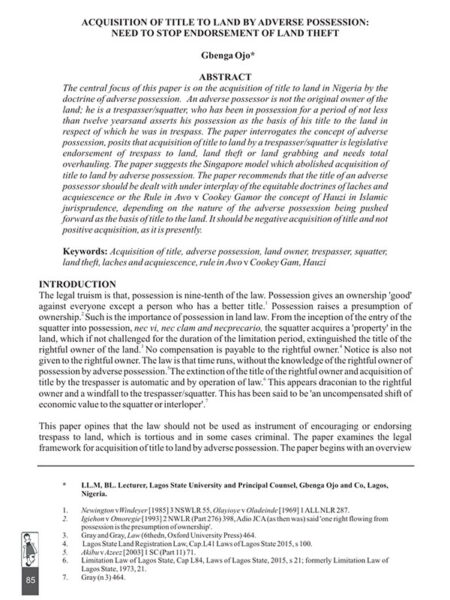
Acquisition of Title to Land by Adverse Possession: Need to Stop Endorsement of Land Theft
0₦2,500.00Gbenga Ojo, Lagos State University and Principal Gbenga Ojo and Co Lagos Nigeria in his article, Acquisition of Title to Land by Adverse Possession: Need to Stop Endorsement of Land Theft, interrogates the concept of adverse possession in land law. He posits that acquisition of title to land by a trespasser/squatter by adverse possession is tantamount to land theft. He argues that the claim of an adverse possessor rather than being dealt with under limitation laws should be taken care of by an interplay of the equitable doctrines of laches and acquiescence or the Rule in Awo v Cookey. He recommends a reform of the law and the adoption of the Singaporean model which abolished acquisition of title to land by adverse possession.
-
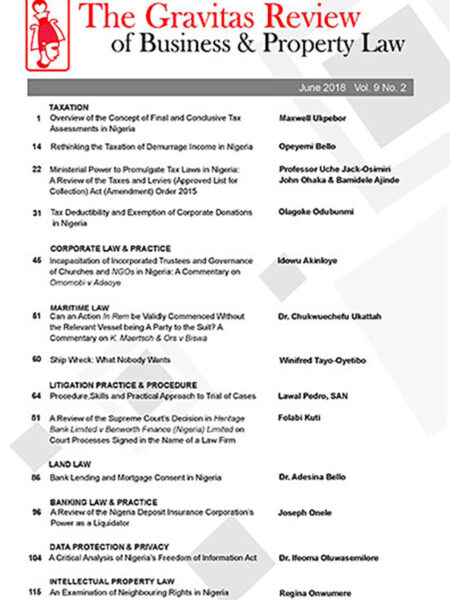
The Gravitas Review of Business & Property Law Vol.9 No.2 – Print
0₦5,000.00In this issue of The Gravitas Review of Business & Property Law Vol.9 No.2, there are well researched articles on:
- Taxation
- Corporate Law & Practice
- Maritime Law
- Litigation Practice & Procedure
- Land Law
- Banking Law & Practice
- Data Protection & Privacy
- Intellectual Property
The Gravitas Review of Business & Property Law



